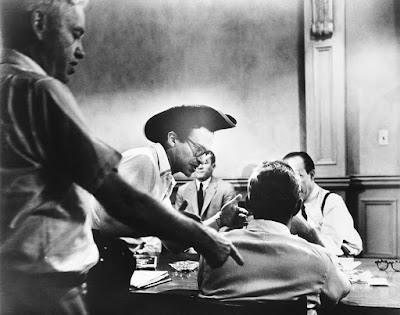This utterly charming, entertaining and information-crammed documentary begins with a wonderfully ridiculous quote by the late François Truffaut so redolent of that peculiar French snobbery (coupled to Anglophobia) that you almost can't believe this great filmmaker would have been stupid enough to say it. Well, never say never.
The short documentary's subtitle is apt, as well. "Personal" indeed -- as Stephen Frears (shown above and at right) tells us within the first few minutes how he learned about both punishment and sex from movies and his school's headmaster. Not to worry: There's nothing really actionable here. What there is, however -- as with Bertrand Tavernier's delightful, informative (and a good deal longer and deeper) French counterpart -- is a grand run through several decades of a country's cinema (including some fascinating bits about British television) that, while hardly inclusive (there's a list of movies at
the finale Frears apologizes for leaving out), manages to touch a remarkable amount of films and filmmakers in a brief, intelligent and thoughtful manner.
Co-directed by another filmmaker and documentarian, Michael Dibb (shown at left), TYPICALLY BRITISH: A Personal History of British Cinema by Stephen Frears will reacquaint you with some of the leading lights of Brit film, as well as with some names you probably have not even heard of but will want to learn more about (and maybe view some of their work).
The film sits Mr. Frears down with two sets of two British film personalities of different generations: the first with writer/director Alexander Mackendrick and screenwriter Gavin Lambert, the second with filmmakers Michael Apted (below, center) and Alan Parker (below, left; that's Frears on the right). Both sessions are wonderfully rich with pertinent, occasionally gossipy movie-insider information.
What helps set the documentary apart is all this very interesting detail about filmmaking via these five men, all of whom have worked in the film industries on both sides of the Atlantic. In addition to history and critical analysis, this adds some genuinely telling information about the filmmaking process, as well as about those working behind (but not so much in front of) the camera.
Fascinating tidbits abound, such as Laurence Olivier's narration for the documentary about the coronation of Queen Elizabeth II, an event, we are informed, that sent so many Britishers out to purchase television sets (then relatively new) that this hastened the decline of the British film industry. (Ah, yes: Yet another thing that obnoxious royal family has to answer for.)
Mr. Apted has much to say about how important was the very good British television of his time, while Mr. Parker provides huge enjoyment via his reminiscences and willingness to admit certain things. Regarding the "art" cinema that turns so many heads in the 1960s, "I thought Ingmar Bergman was the one who appeared in Casablanca." And as the men discuss the multi-Oscar-winning movie Darling, "Did you dream about Julie Christie?" (she's shown below) Frears inquires. "I did more than dream about her," Parker shoots back.
From Hitchcock to Powell & Pressburger, Ken Russell, Nicolas Roeg and Ken Loach to producers such as Michael Balcon and David Puttnam, if they are not all here, well, plenty of them certainly turn up. Near complete agreement seems to arrive from our fellows regarding the films of Ken Loach, in particular Kes (below), as one of the "greats" of British film. First to last, this doc is a consistent delight and a necessary reminder of just how much Britain has contributed to cinema down the decades. So: Fuck you, but I still love you, M. Truffaut!
You can watch Typically British: A Personal History of British Cinema by Stephen Frears (74 minutes long) now via OVID, the subscription streaming service that, as much as does some better-known and much-longer-around streaming services for art films, provides a remarkably rich and varied menu of narrative and documentary film. Click here for more information.














































